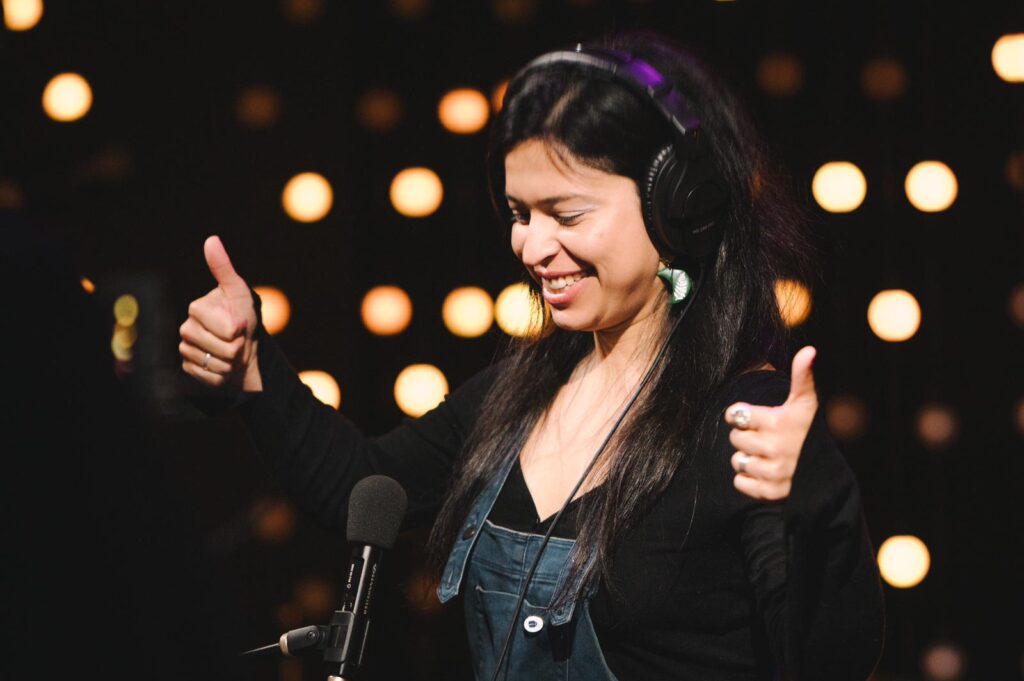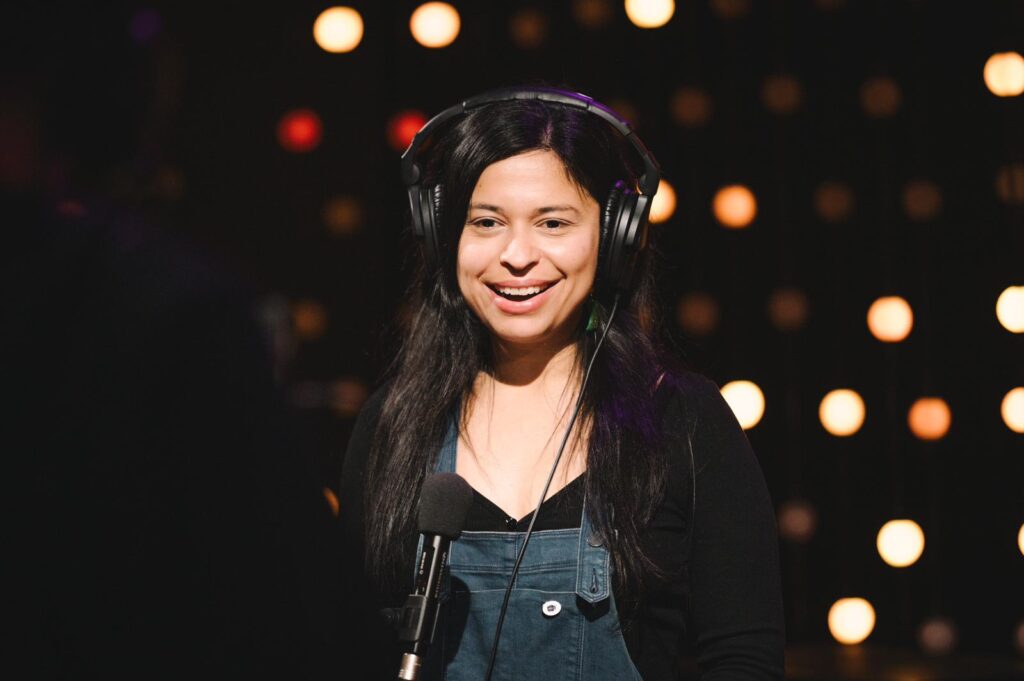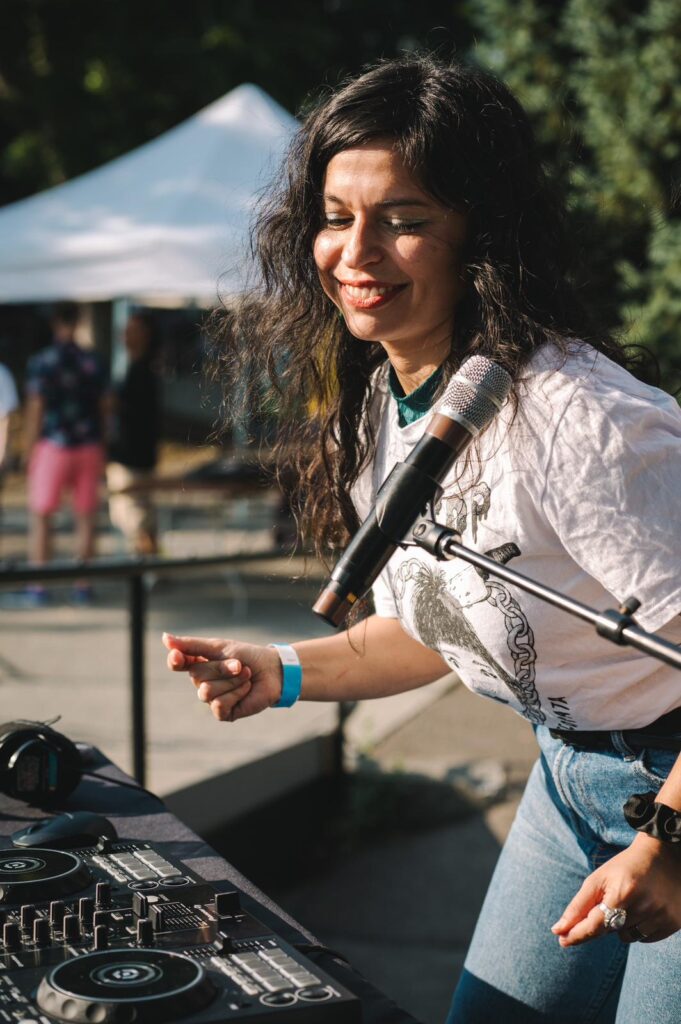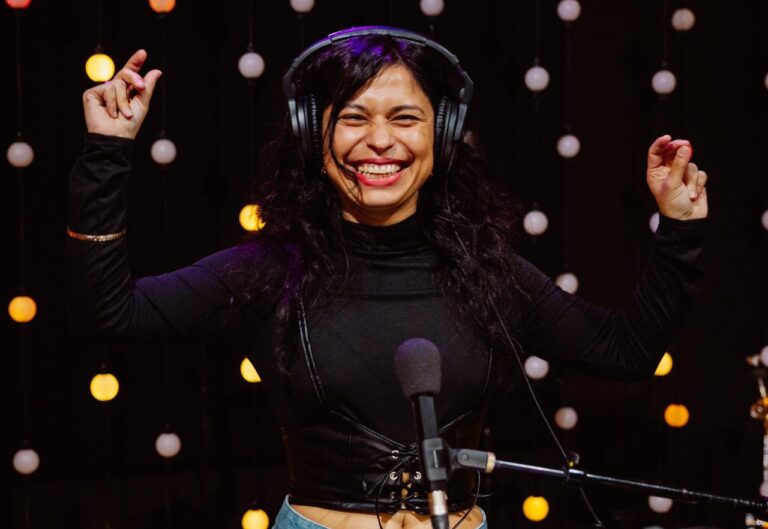“When I was 11 or 12 years old, my mother took me to live concerts of bands that were doing national tours, managing to get to Mendoza, at the foot of the Cordillera,” Albina Cabrera recalls. Those were the seeds that led her to get involved in the local scene as a teenager. This also goes some way to explaining what many years later motivated her to travel thousands of miles and leave behind many valuable things to get the job of her dreams. That job she always wanted, the one she wouldn’t change for anything. Since her beginnings doing community radio in Argentina, she always dreamed of working at KEXP.
Today, Albina Cabrera is part of the DJ staff of the famous Seattle-based station and takes over as its Latin American host. This adventure began in 2018 when she applied to volunteer for a month for the El Sonido show. That month turned into three. And those three months turned into six that finally led to a contract. Of course, it was quite a change. This meant moving to another country, to the other end of the continent, adapting to a different culture and learning to speak English.
“I’ve always been a fan of KEXP, that’s why I ended up moving to Seattle… It’s like working with your favorite band.”
“I’ve always been a fan of KEXP,” Albina says from the start. “That’s the reason why I jumped into this pool and ended up moving here to Seattle… Well, it has brought me a lot of very crazy things that I never thought I’d be able to experience.” Originally from Mendoza, a province that shares the Andes mountain range with Chile, she also works as a music publicist. But nothing compares to the great step she has taken on the radio. “KEXP is like working with your favorite band,” she adds, hinting at an analogy that she experienced first-hand as press manager for the Argentine indie band El Mató A Un Policía Motorizado.
Albina’s story with KEXP wouldn’t have been possible without William Myers, better known as DJ Chilly. “I met him at an event and emailed him every week for nine months, until one day he responded,” she says. “There I started as part of a group of collaborators from different cities who sent him music. I immediately saw myself at KEXP. There isn’t a project or a radio or anything that I’m more excited to be on than KEXP. I’m talking about the value that music has there, about the respect there is for musical conversation. It’s a media with its audience, but it’s also a media for artists. It’s about contemplating how to develop artists, and understanding the importance of a humanely curated platform that generates an artistic construction. That to me is beautiful.”
“I was always very involved in the local scene. That was my natural sphere.”
Music and radio came into Albina Cabrera’s life very early and almost at the same time, halfway between being a child and a teenager. She became interested in promoting music and supporting local bands as a fifteen-year-old — even if she didn’t know how to do it yet. “I was always where the concerts were held in the neighborhood,” she says, noting that she grew up surrounded by friends who became musicians. “I was always very involved in the local scene. That was my natural sphere.” Her interests were outlined by what was within her reach. I didn’t have a reading of the outside, of the international. However, she confesses: “As a child, of course, I also liked American pop, things like the Backstreet Boys. And discovering Shakira with her first album broke my mind at a Latin American level.”

As a teenager, Albina Cabrera began to relate to the live show in a different way. “I wanted to know how to produce and get into everything that a concert entails,” she says. “I was always around, going out to put up posters or hanging out in my friends’ rehearsal room. I think that then became a vehicle that complemented my love for radio. I’d fall asleep listening to the radio: there was a station in Mendoza that played local rock bands every night. I mean, it was something specific. Then, when I was 16, I started sending messages to the radio.” One day, finally, the doors opened. “They invited me to the radio and I stepped into a studio for the first time. I immediately said: ‘This is the best, I’d love to study this.’ To which the host replied: ‘Don’t do it, you’re going to starve yourself,’” she remembers, laughing. Of course, she ignored him and signed up to study social communication.
Long before moving to Seattle, when she was barely 21 years old, Albina moved to Buenos Aires. It all started when she attended some workshops in Mendoza by ETER (Tertiary School of Radio Studies). There she met the great journalist and broadcaster Eduardo Aliverti, who suggested she go to the great capital city. “For me, in that context, it was impossible even to think it,” she recalls. “Then he told me to apply for a scholarship. I did it. And they gave me half a scholarship. So I left my home and arrived in Buenos Aires. I studied and received my degree as a radio and television broadcaster. And I immediately started working on the radio. I did a lot of AM, FM, and prime-time news, as a floor announcer, reading the news. I worked for about five years in Télam, the Argentine state news agency, which has now been closed by the current president.”
It was the 2000s and Buenos Aires youth embraced the rise of indie-rock. From that burgeoning local scene came bands like El Mató A Un Policía Motorizado, spearhead of La Plata label Laptra. Albina not only fell in love with that band and that label, but she also became the publicist for both. “That sound, for me, changed a whole generation. That toughened me up. I mean, I wouldn’t be the same without those bands, without that scene and that generation,” she explains. For her and many others, El Mató defined the sound of an era of rock in Spanish. “It’s one of the bands that has best worked on the underground issue at a regional level, with great growth from the 2000s to now,” she notes.
Many years later and now part of the KEXP staff, Albina Cabrera made another dream come true: taking the radio to her native country, in its first foray into South America. KEXP Live from Argentina was a remote broadcast that took place in September 2022, with the support of the Argentine Ministry of Culture, at the Kirchner Cultural Center. Albina traveled along with fellow KEXP hosts Cheryl Waters and DJ Chilly to do live radio broadcasts for an entire week, with three Live on KEXP sessions per day.
There were live performances of all kinds, from indietronic icons like Juana Molina to new urban pop stars like Nicki Nicole, from new shoegazers Riel to new yacht-rockers Bandalos Chinos. It’s worth highlighting the female presence, with bands such as Fin del Mundo and Blanco Teta, and solo artists such as Lucy Patané, Marina Fages and Sara Hebe. Albina also included some names from that indie scene that marked her so much, such as Mi Amigo Invencible and Atrás Hay Truenos.
“What we did in Argentina, getting there with KEXP… I’ll remember that when I die!”
“What we did in Argentina, getting there with KEXP… I think I’ll remember that when I die,” Albina says, pridefully. “I couldn’t believe that was happening. Now maybe I understand a little more. But at that time it was crazy, with three simultaneous stages, an audience, and tickets that sold out within 20 minutes for all sessions. Personally, as a professional, it was a tribute and a celebration of everything I went through and that scene taught me, which allowed me to get to KEXP. Also knowing how Latin America loves and cares for music. We are great listeners, we are great music lovers. Well, it’s not for nothing that Mexico is the country that consumes the most streaming music in the world.”

Albina’s musical-cultural nutrition began to expand regionally back in 2016, to finally outline a Latin American map based on radio shows like KEXP’s El Sonido, blogs like Club Fonograma, and feminist music platforms like Ruidosa (in tune with Ruidosa Fest, created and directed by the Chilean artist Francisca Valenzuela). “When I found El Sonido, I couldn’t believe it. I think it was at the same time that I found Club Fonograma,” says Albina. “That’s where the whole Latin alternative music boom took place in the US. That’s where what Latin artists do begins to resonate, not just in the diaspora but throughout Latin America. I think I ended up connecting with that map with Ruidosa. There I felt that this scene that I was experiencing in my country was also happening in Chile, Uruguay and the entire region. I love these platforms that show you what is new. That’s why KEXP became like a beacon for me. I need new things all the time. And the path was always local first, then national, and then Latin American.”

Albina grew up listening to rock, but she was never alien to Latin American folklore. Somehow, popular music always passes through you. “In Argentina there’s tango, but Latin American folklore raises you,” she says. The fact that she’s currently planning to do a Mercedes Sosa series next year for KEXP is like a full circle for her. “It’s something that started when I was 18 and made my first documentary with my classmates about the New Latin American Songbook. That movement forged all Latin American scenes, from Nueva Canción to Nueva Trova, even the French Chanson. It was very involved in the political contexts of the 60s and 70s. And there’s something that greatly influenced everything I promote and that captivates me, which is politics. I was involved in political organizations for much of my twenties. So, I’m South American. The revolutions of the 70s run through my blood, the path of Latin American dictatorships runs, the ghosts of Plan Cóndor run… I mean, I learned all that by listening to Latin American folklore, and its brother, which is rock in Spanish, from Charly García to El Mató, from Los Prisioneros to Mon Laferte.”


